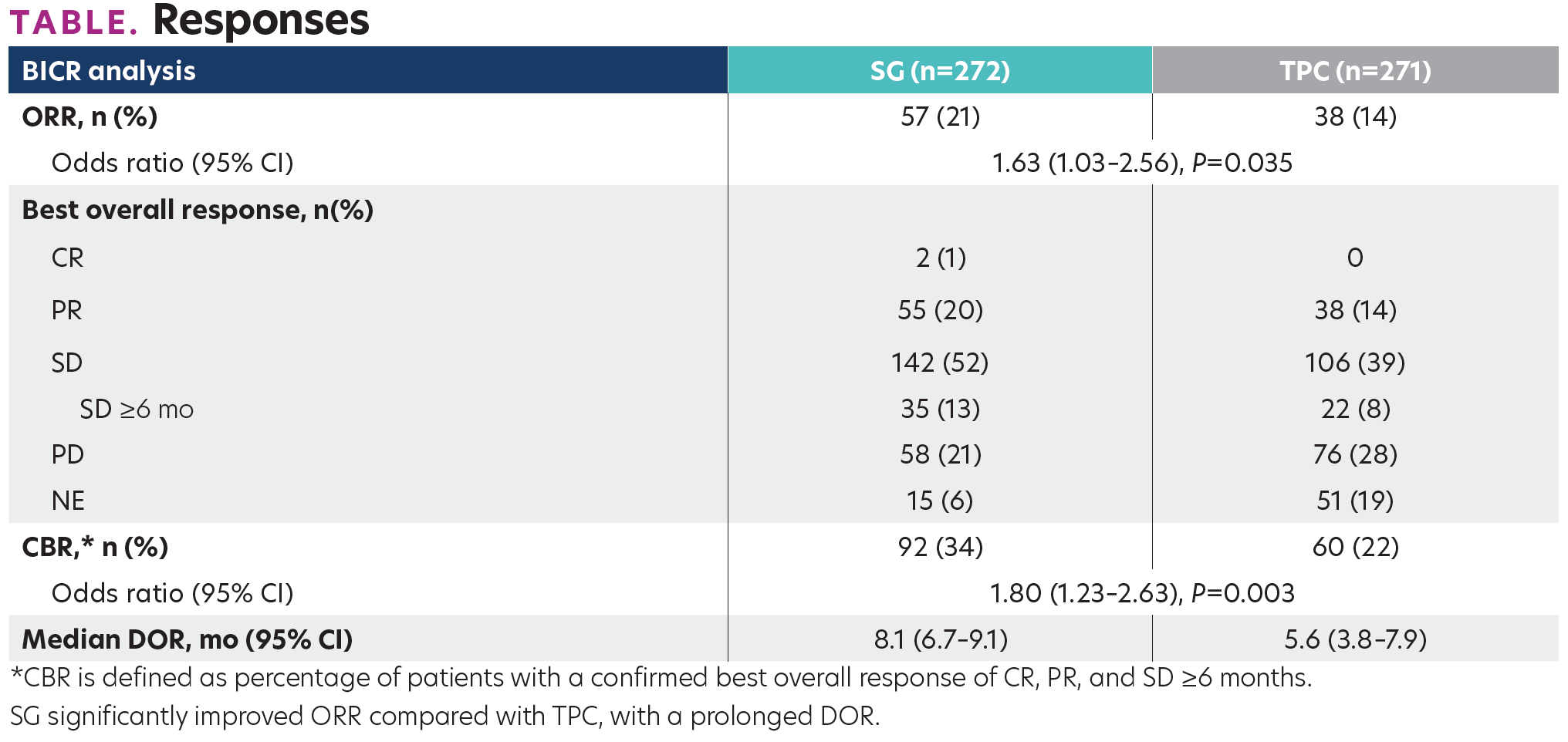53 Overall Survival (OS) Results From the Phase 3 TROPiCS-02 Study of Sacituzumab Govitecan (SG) vs Treatment of Physician’s Choice (TPC) in Patients (pts) With HR+/ HER2− Metastatic Breast Cancer (mBC)
TABLE. Responses

TABLE. EORTC QLQ-C30 Time to Deterioration Endpoint

Background
Pts with HR+/HER2– mBC are treated with endocrine-based therapy (ET), followed by single-agent chemotherapy (CT), with increasingly shorter durations of benefit. SG is an anti– Trop2 antibody-drug conjugate approved for triple-negative mBC with ≥2 prior therapies (≥1 in metastatic setting). In TROPiCS-02 (NCT03901339), SG showed significant progression-free survival (PFS) benefit vs TPC in ET-resistant HR+/HER2− mBC (HR, 0.66; P <0.001; median 5.5 vs 4.0 mo). Here, we report the planned TROPiCS-02 OS 2nd interim analysis.
Materials and Methods
Eligible pts with HR+/HER2– mBC who received prior taxane, ET, CDK4/6 inhibitor, and 2-4 prior CTs were randomized 1:1 to receive SG (10 mg/kg IV on d1 and d8, every 21d) or TPC until progression or unacceptable toxicity. The primary end point was PFS by BICR with key secondary end point of OS. Per protocol, OS was analyzed after ~350 events. In the statistical testing hierarchy, objective response rate (ORR) and pt-reported outcomes are tested sequentially if OS is significant.
Results
543 pts were randomized to receive SG (n = 272) vs TPC (n = 271). Pts had a median of 3 prior CTs for mBC, and 95% had visceral metastases. At data cutoff on July 1, 2022 (median follow-up, 12.5 mo), 390 OS events had occurred. SG significantly improved OS (median 14.4 vs 11.2 mo; HR, 0.79; P = .020), ORR, global health status/QoL, and fatigue vs TPC (Table). The safety of SG was consistent with prior reports, with no new safety signals identified.
Conclusions
This was consistent with prior reports, with no new safety signals identified. SG demonstrated a statistically significant and clinically meaningful improvement in OS, and significant improvement in ORR and QoL, vs TPC with manageable safety in pts with ET-resistant HR+/HER2– mBC, a population with limited treatment options. These data reinforce the use of SG as a novel therapy for pts with pretreated HR+/ HER2– mBC.
AFFILIATIONS:
Hope S. Rugo,1 Aditya Bardia,2 Frederik Marmé,3 Javier Cortes,4 Peter Schmid,5 Delphine Loirat,6 Olivier Trédan,7 Eva Ciruelos,8 Florence Dalenc,9 Patricia Gómez Pardo,10 Komal L. Jhaveri,11 Rosemary Delaney,12 Theresa Valdez,12 Hao Wang,12 Wendy Verret,12 Sara M. Tolaney13
1Department of Medicine, University of California-San Francisco, Helen Diller Family Comprehensive Cancer Center, San Francisco, CA.
2Medical Oncology, Massachusetts General Hospital Cancer Center, Harvard Medical School, Boston, MA.
3Medical Faculty Mannheim, Heidelberg University, Department of Obstetrics and Gynaecology, Mannheim, Germany.
4Medical Oncology Department, International Breast Cancer Center (IBCC), Pangaea Oncology, Quirosalud Group, Madrid and Barcelona, Spain, Universidad Europea de Madrid, Faculty of Biomedical and Health Sciences, Department of Medicine, Madrid, Spain.
5Barts Cancer Institute, Queen Mary University of London, London, United Kingdom.
6Institut Curie, Medical Oncology Department and D3i, Paris, France.
7Medical Oncology Department, Centre Léon Bérard, Lyon, France.
8Medical Oncology, Hospital Universitario 12 de Octubre, Madrid, Spain.
9Institut Claudius Régaud, Toulouse, France.
10Hospital Universitari Vall D’Hebron, Barcelona, Spain.
11Memorial Sloan Kettering Cancer Center (MSKCC), New York, NY.
12Gilead Sciences Inc, Foster City, CA.
13Department of Medical Oncology, Dana-Farber Cancer Institute, Boston, MA.
